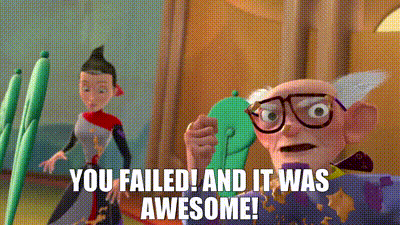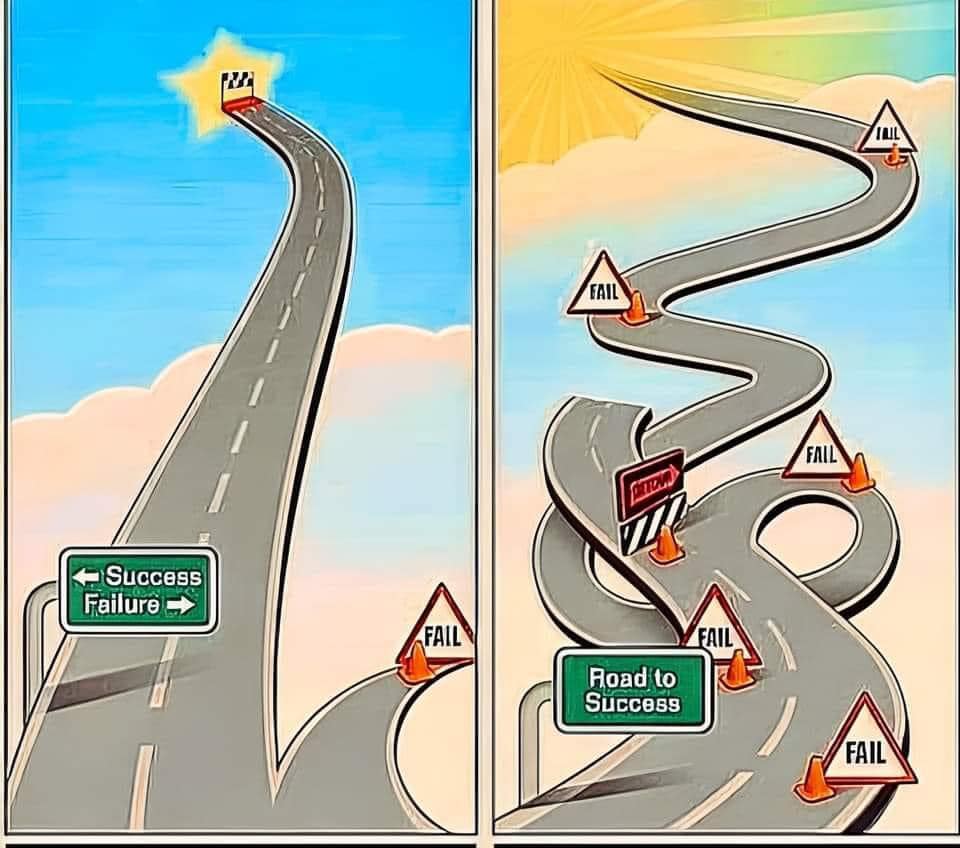Congrats! You Failed! : Part 1 - The philosophy of failure

“The master has failed more times than the beginner has even tried.” ― Stephen McCranie
“YOU ARE A FAILURE”. Nobody likes to hear these words; those who have heard these words don't like to talk about them because it is a symbol of shame and inadequacy.
But imagine this: What if we live in a world where hearing the words “YOU ARE A FAILURE” is a compliment? A world where failing multiple times is celebrated because it is a symbol of perseverance, courage, learning, and overcoming shame? This is how failure should be treated, because you tried something despite having no guarantee of success. That alone is worth celebrating.

The concept of failure is often misunderstood, and ironically, this misunderstanding can cause even more failure.
A quick search on Google for the word “FAIL” reveals the definition below:
Fail, verb
- To be unsuccessful in achieving one's goal. Example: “he failed in his attempt to secure the election.”
According to this definition, if you try to move from Point A (where you are now) to Point B (your goal) but don't make it, then you are a failure. If that is true, then we are all failures. The dictionary definition is the issue; it traps you into thinking failure is final.
So before we move forward, do this: unlearn that definition. In fact, erase it from your dictionary. Now, let's go on a philosophical journey to uncover the true meaning of failure and how to minimize it
THE TRUE DEFINITION OF FAILURE

Think of a successful person - whether in business, relationships, academics, spirituality, or family. Now, find out if they failed at some point on their journey. 99.999% of the time, the answer will be yes, they failed at some point.
This is confusing. How can the successful person you know tell you that they failed? Hmm 🤔, then there must be an issue with our current understanding of failure.
Let's redefine it.
Failure Definition 1
If the successful person encountered setbacks, but tried again, and still managed to achieve their goal, then:
Failure is THE PATH to achieving one's goal. - not the inability to achieve your goal.
Failure Definition 2
On their journey, if they had given up at the first encounter of failure, then they would never have popped up in your mind as a successful person in the first place. If that's true, then:
Failure is GIVING UP without exploring the full path
Thus, failure is only true if you acknowledge that that is the end of your path. This makes the concept of failure more about a decision than a fact. Only you can decide if you have failed or not.
Failure Definition 3
For every setback, there is always a lesson; this is the universal truth about failure. If you catch the lesson early, it is no longer “failure” but a learning experience. You cannot defeat someone with this mindset, because they see failure as an education, not defeat. This brings us to our 3rd definition of failure:
Failure is refusing to learn from setbacks
A Formal Definition of Failure
Now that we know the real-world definition for failure, let us replace the one in our dictionary with the realistic and formal definition below:
Failure, Noun
- Failure is the path to achieving one's goal. Example: the entrepreneur’s failure to make his last 3 businesses profitable led to the success of the 4th business
- Giving up without exploring the full path. Example: He became a failure the moment he gave up on his first try
- Someone who did not learn any lessons after a setback to his goal. Example: He failed again because he didn't learn from his past mistakes
Final thoughts
Your inability to go from Point A to Point B does not make you a failure. You become a failure if you:
- Don't acknowledge that it is a path, and you must try again.
- Give up before the journey is complete
- Refuse to learn from your mistakes
Every successful person has a story of failure. From the dawn of civilization to date, there is one universal fact consistent with all the stories: they never gave up, they learned from their mistakes, and they tried again.
One story that inspires me the most is Colonel Harland Sanders, the founder of KFC, who found his purpose and success at a very late age of 62.
That got me wondering, how can we shorten the timespan for failure? In the next section, we see some actionable steps on HOW TO LEARN FASTER THAN YOUR LOSSES.




